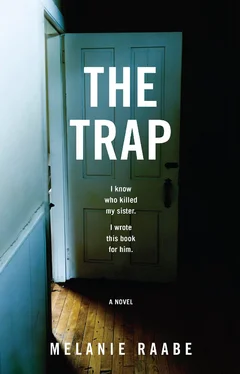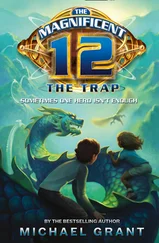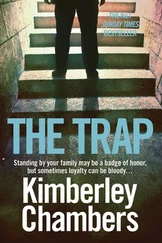For quite some time he hasn’t been talking to me but to himself.
“I’m more than that,” he says quietly.
Now I know why I was taken in by him, why I believed him. He wasn’t lying to me when he said he was innocent — just a journalist, just a father, just a good man. He really believes it. It’s his truth — his skewed, distorted, cobbled-together, self-righteous truth.
Lenzen glances up at me.
There’s determination in his eyes. A cold shudder runs down my back. We’re alone. Julian’s not going to come. Who knows whether he ever got home? Who knows whether his girlfriend will ever pass on my message? It no longer matters. It’s too late.
“You can still do the right thing,” I say. “You can go to the police and confess what happened that night.”
Lenzen shakes his head. “I can’t do that to my daughter.” He doesn’t take his eyes off me.
“Do you remember asking me whether there was anything I’d kill for?” he asks.
“Yes,” I say, swallowing heavily. “Your daughter.” He nods.
“My daughter.”
At last I understand the strange expression on Lenzen’s face that I wasn’t able to interpret. Lenzen is sad. Sad and resigned. He knows what’s next and he doesn’t like it. It makes him sad.
I look at him — the journalist, the war correspondent. What a lot his gray eyes have seen, what a lot of stories in those lines on his face. I think to myself that in different circumstances, I would probably have liked him — in different circumstances, it would be nice to sit here with him and talk about Anna.
He would remind me of things I had forgotten or never known about — little quirks. But these aren’t different circumstances and there are no others.
“I’ve made sure that someone will come and look for me if I don’t report back,” I remind him huskily.
“Give me your phone, Linda.”
“No.”
“What I’ve told you is only meant for you,” he says. “It’s true what you said earlier — you more than deserve the truth. It was only fair to tell you what you wanted to know. But now give me your phone.”
He gets up. I stand too, and back away a few steps. I could make a dash for the stairs, but I know he’d be quicker and I don’t want him behind me — him and that heavy ashtray.
“Okay,” I say.
I put my hand under my jumper and pull out the phone. Lenzen’s body relaxes. What follows happens quickly. I don’t stop to think. I make a dive for the windows, fling one open and hurl the phone out in a high arc. It lands somewhere in the grass. A hot pain grips my arm. I turn around.
And find myself looking into Lenzen’s cold eyes.
For such a long time I had only one wish: to find Anna’s murderer. Now that I’m standing face-to-face with him and everything has been said, I want something else.
I want to live.
But there’s no way out of here. With two short steps, Lenzen has blocked the way to the front door, and the balcony is out of the question. Nevertheless, I fling open the door and step outside. A cool wind brushes my face. Another two steps and I’m at the balustrade.
I can’t go any further. Looking down, I can make out the lawn in the dark and, beyond it, the road where the taxi stopped. It’s too far to jump. No escape. I hear a metallic noise and sense Lenzen behind me.
I turn to face him — can’t believe my eyes. He’s crying.
“Why didn’t you stay in your house, Linda?” he asks. “I’d never have done anything to you.”
In his hand he’s holding a gun. I stare at him aghast. He can’t get away with that. People will hear the shots, especially here, in this quiet residential area. How can he possibly hope to get away with it?
“The police will be here almost the second you pull the trigger,” I say.
“I know,” Lenzen replies.
I don’t understand what’s going on. I look into the muzzle. I’m stunned — as if hypnotized. It looks exactly like my pistol — the one I threatened him with, the one he ended up throwing in the lake. My synapses click as it becomes clear to me.
“You recognize it,” says Lenzen.
It is my gun. There’s nothing in the lake at all. I see it before me — Lenzen’s arm moving through the darkness, making to throw but not letting go. Lenzen dropping the gun somewhere, unnoticed — on the grass, perhaps — to be picked up again later, unobserved, just in case. Canny. Quick-witted. He can’t have planned that. It practically fell into his lap — a gun, procured by me illegally and covered in my fingerprints.
“That’s my gun,” I say feebly. Lenzen nods.
“It was self-defense,” he says. “You’re clearly mad. You had me followed, you had me watched. You threatened me — I have that on tape. And now you turn up in my house with a gun. There was a tussle…”
“Did you ever intend to leave the country?” I ask.
Lenzen shakes his head. I understand at last. It was a trick to make sure I came here. In a rush. In a panic. Before the night was over. A simple and elegant trick to lure me to his house and get rid of me at last. With my own gun.
A trap is a device to catch or kill.
The trap that Victor Lenzen set for me is masterly.
He’s got me. I can’t get away now. But his gun hand is trembling.
“Don’t do it,” I say.
I think of Anna.
“I have no choice,” Lenzen replies. His forehead is beaded with sweat.
“We both know that’s not true,” I say.
I think of Norbert, of Bukowski.
“But it sounds like the truth,” says Lenzen. His upper lip twitches.
“Please, don’t do it!”
“Be quiet, Linda.”
I think of Mum and Dad.
“If you do this, you really are a murderer.”
I think of Julian.
“Shut up!”
Then I have only one thought: I’m not going to die here.
I turn around, clear the parapet of the balcony with one leap, and fall.
I land heavily. It’s not like in a film. I don’t roll over and hobble away; I come crashing down and my right ankle is gripped by such intense pain that for a moment it’s as if I’m blinded, and I crouch there on all fours like a wounded animal, confused and almost sightless with fear. I shake my head, trying to drive away the dazed feeling. Then I look about me, expecting to see Lenzen standing at the balustrade, looking down at me. But there’s no one there. Where is he?
Then I hear him. Oh God, how long have I been crouching here? I try to get up, but my right leg lets me down, giving way.
“Help,” I scream. But no sound comes out. I realize that I’ve landed in one of my own nightmares — that I’ve dreamt this so often, whimpering and drenched in sweat, this dream where I scream and scream and no sound comes out. Again, I try to get up, and this time I succeed.
I hop on my good leg, stumble, catch my fall on my bad leg, whimper with pain, go down on my knees, can’t go on, but must go on, crawl along, blind and scared, through the darkness. Then I see him, before me. I don’t know how he did it; he should be behind me, coming from the house, but he’s coming from ahead; he emerges from the darkness without warning and comes toward me. I ignore my pain and stand up. I see only his silhouette, the gun in his hand, and stand to face him.
He’s a shadow, a mere shadow. He looks about him frantically. And then he’s near enough for me to recognize him.
The sight of him catches me like a punch. I totter, my leg gives way again, and I fall to the ground. Then he’s beside me, bending over me. His worried face, his different-colored eyes in the darkness. Julian.
“My God, Linda,” he says. “Are you injured?”
“He’s here,” I croak. “Lenzen. My sister’s murderer. He has a gun.”
Читать дальше












